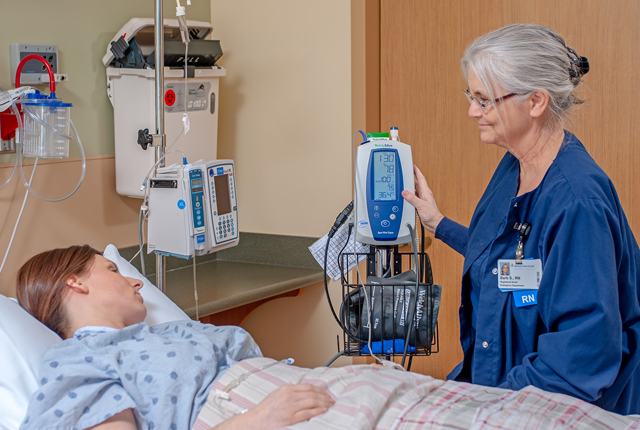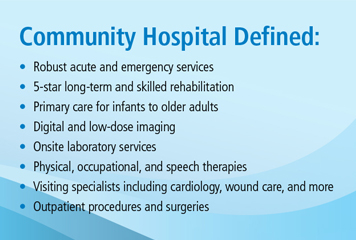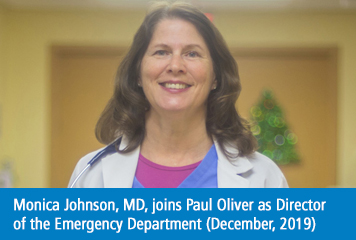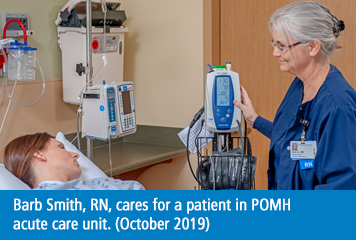Small Hospital Offering the Unexpected

Healthcare trends in the 1990s left small rural hospitals like Munson Healthcare Paul Oliver Memorial Hospital sending more of their emergency and acute care patients to larger hospitals, such as Munson Medical Center. Paul Oliver is changing this practice, offering a depth and breadth of services you would be surprised to find in such a small community.
Paul Oliver began this transformation in 2018 when its Board of Trustees approved a strategic plan focused on returning to what they considered a “true community hospital.”
Trauma Level IV Emergency Care
The hospital received its Trauma Level IV designation in December of 2018, which indicates an ability to provide gold standard quality care in the Emergency Department. Barb Smith, RN, was the trauma prevention coordinator at the time and was personally recognized by the State of Michigan as a Hometown Hero for her efforts related to this work.

Kristi Johnson, MSN, RN, Paul Oliver’s chief nursing officer, now oversees the department after leading Munson Medical Center’s emergency department for more than ten years.
Providing robust emergency care locally offers the community many benefits:
- Fewer trips to Traverse City, decreasing emergency response times locally, and reducing the pressure to add ambulances and staff members to the EMS team; a cost that may fall to the community
- Less travel burden on families supporting loved ones in the hospital
- Ability to park near the door, ease of admission, and average door-to-doctor time of five minutes
- Location of the emergency department near to acute care, allowing patients to transfer just down the hallway if admitted
- A small department offering a quiet and healing environment in private rooms

With satisfaction scores at or above 95 percent, patients like Dr. David Blessing, retired family physician and local resident, are benefiting from this care first hand.
“Physicians often approach care with a critical eye when they have their families involved. This thinking proved to be unnecessary,” said Blessing. “Dr. Johnson did an exceptional job and was
exceptionally competent. I didn’t expect to run into a board-certified ER physician at such a small hospital. It was an unusual and unexpected positive experience.”
Monica Johnson, MD, board-certified emergency department physician, joined the team in 2019 and has big plans for the department.
Johnson explains, “The hospital had already received their trauma certification when I arrived, which is a huge accomplishment. Moving forward, we’ll look to other certifications, not because they are a nice pat on the back, but because they ensure we are current on best practices and demonstrating competency. We’re also really focused on exceptional coordination of care with our acute care department and onsite primary care group.”
Reopening an Acute Care Department
Over the last year and a half, Paul Oliver readied itself to care for patients who need to be admitted or stay overnight in the acute care department. Smith and Mark Kuiper, MD, who brings more than 17 years of experience as a board-certified internist, provide the unit’s 24/7 medical coverage. As part of this initiative, the hospital is focused on low transfer rates and working closely with EMS and other larger hospitals to ensure patients are transported to the most appropriate center for the type of care needed.

Among others, the acute care center currently cares for patients with diagnoses such as:
- Cellulitis
- Congestive heart failure
- COPD
- End of life and hospice care
- Gastroenteritis
- Influenza
- Pneumonia
Exceptional Care Coordination
More recently, Paul Oliver opened an onsite primary care office—the Frankfort Medical Group—which provides routine care for infants up to older adults, but also works closely with the emergency and acute care departments.
These providers bring experience with both hospital-based acute care medicine and office-based primary care, which allows them to manage more complex patients in the office setting. This model helps more patients avoid the need to stay in the hospital overnight in an acute care department, reducing costs associated with care for those patients, and improving their quality of life.
The physical space of the hospital works to the group’s favor, with the primary care office, emergency department, and acute care unit within a 30-second walk. And with providers who cover all three areas, exceptional care coordination is a priority.
“This is a really exciting time to be at Paul Oliver. I’ve cared for thousands of patients in many settings, but I’ve never been so impressed by a team’s ability to adapt to new models of care that truly put the patient first,” said Nancy Smith, MD, Paul Oliver chief of staff and primary and acute care physician.